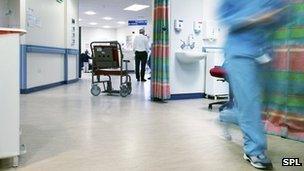Waiting times: Scan delay busts NHS treatment guarantee
- Published

All 14 NHS boards in Scotland have been audited about waiting times targets
Hundreds of patients waiting for diagnostic tests are not being treated within the Scottish government's 18 week guarantee, it has emerged.
Some 550 people at risk of bone fractures are waiting up to eight months for a scan to detect osteoporosis at a clinic in Aberdeen.
NHS Grampian did not have to include patients waiting for tests or scans in official figures.
The Scottish government said the length of wait for a scan was "unacceptable".
The government pledged that no-one would wait longer than 18 weeks for treatment from December 2011.
Clinic scans
Although official figures appeared to show that this pledge was being met, a series of scandals revealed that health boards have been cheating the system in order to meet the target.
Last year it emerged that NHS Lothian had been fiddling its waiting time figures by offering patients appointments in England which they couldn't be expected to attend.
As a result, the Cabinet Secretary for Health Nicola Sturgeon was forced to make a statement to parliament assuring MSPs that health boards were following the rules correctly.
However, audits of all Scottish health boards found that NHS Tayside has wrongly marked some patients down as "unavailable".
Now BBC Scotland has learned that a clinic which treats 3,500 people a year has been telling patients that they must wait 32 weeks for a scan.
The long waits these patients faced have not been recorded in official figures.
BBC Scotland discovered the discrepancy after being contacted by a patient in Aberdeen.
She is in severe pain while she waits for the DXA scan to determine whether she is suffering from osteoporosis.
Performance audit
An audit of NHS Grampian's waiting time performance, published just last month, gave the health board a clean bill of health.
As well as not counting patients waiting for DXA scans, NHS Grampian has the highest number of patients marked down as "socially unavailable".
Health boards are allowed to stop the waiting time 'clock' if patients say they are unavailable for treatment.
A total of 14% of all patients on the waiting list fall into this category in Grampian, a figure seven-times higher than the average for mainland health boards.
A spokeswoman for the Scottish government said: "It is unacceptable for any patient to have to wait this amount of time for a diagnostic scan.
"We would expect NHS Grampian to explore all options to reduce exceptionally long waits for patients, including exploring the use of additional capacity from another board or the independent sector, and we will be raising this with them as a matter of urgency."
NHS Grampian said: "We continue to prioritise patients based on their clinical need.
"Urgent cases will be seen within two weeks e.g. scans that are part of a cancer pathway.
"There are a number of patients who we acknowledge have been waiting much longer than we would wish for, however we are urgently looking at a number of ways to alleviate this, including mobile scanners in the community and we are actively exploring the possibility of sourcing scanning facilities in alternative locations."
Update 24 January 2013: Some of the figures in this article were revised in the light of new information which was provided by NHS Grampian following publication.
- Published21 January 2013
- Published20 December 2012
- Published20 December 2012
- Published4 December 2012
- Published27 November 2012